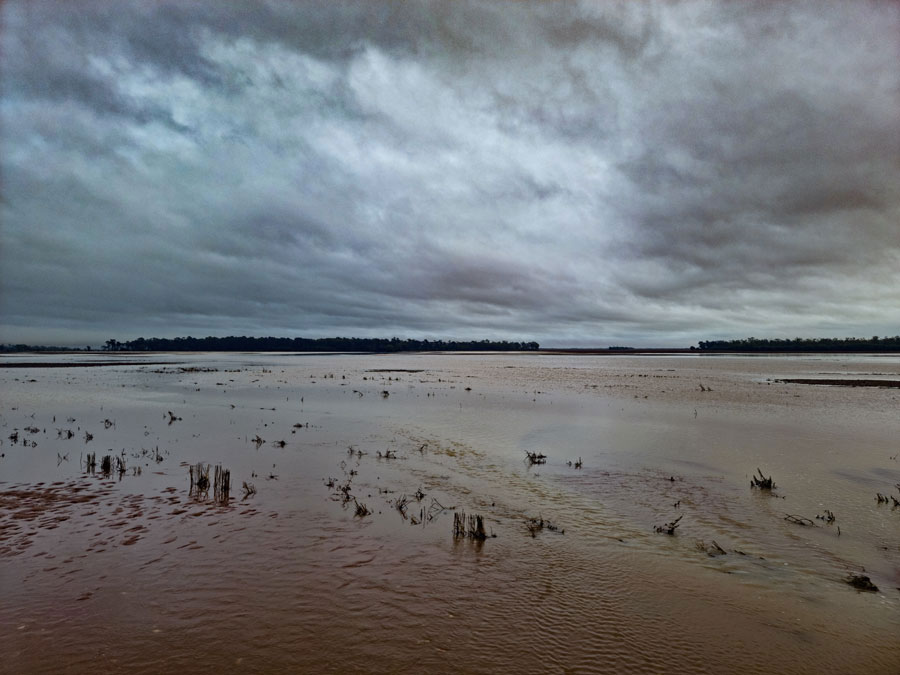When a flood event hit the Condamine in Queensland last year, Jake Hamilton knew that all the hard work he and his family had put into levelling the country had paid off.
Jake farms near fellow grower Ben Taylor and has been busy addressing melon holes since 2006. He says last year’s weather was a good indication that they are going in the right direction.
“Right in the middle of our main season planting window, in mid-May, we had 300 millimetres in a week. Of that, 147mm fell on a Thursday morning between midnight and 6am.
“I have not seen a flood event like that before. There was stubble washed up in places it’s never been.”
Jake says crops planted before that event in melon hole country completely drowned, “whereas crops planted in paddocks that had been levelled with the dozer were fine”.
In fact, they grew to be bumper crops. On one levelled paddock, wheat yields were 6.2 tonnes per hectare. “That is almost unheard-of for our country.”
Key to that success was water flow. “The water moved off the country the way it was supposed to. All the nifty graduated contour banks we’ve done managed to handle all of the water flow without breaching. It saved us a lot of erosion damage.”
In contrast, some melon hole country faced 100 per cent losses. Some paddocks were still wet months later when sorghum was to be planted.
Jake says a flood like that almost instantly pays for the levelling work. “It is certainly worth it.”
Future plans
The levelling work is still ongoing on-farm, Jake says, with the dozer “working flat out”.
Maintenance on paddocks affected by last year’s rain is also on the cards. “Certainly 95 to 98 per cent of the levelling work is done the first time. But when you have wet years, you get some boggy wheel tracks and things like that, so there’s always going to be a little bit of maintenance.”
The current plan is to go over the ground every six years if conditions suit. “After chickpeas, when stubble load is at its lowest point, is a good time to get in and deep-rip fertiliser and run over it with a grader board.”
Jake has just fitted GPS auto height control to his grader board. “It does a fantastic job and has cut down final trim passes from six to three, saving us more time and money.”
The hard work Jake and his family had put into levelling the country paid off. Water flowed like it was intended to, and bumper crops ensued. Photo: Jake Hamilton
When they first started using the board, it lacked control. “You just dropped it on the ground and let it drag. But now if it gets to a low spot where there’s a bit of a fill, it will actually lift itself up and it will drop that dirt out.”
With a spare GPS receiver, Jake fitted it himself after making a bracket and mounting it. “It only took about an hour, and we were away. It is making a big difference.”
Jake was featured in Ground Cover™ two years ago and his story on the family’s levelling journey had interest from across the country.
His father Scott began the process in 2006 with the help of Ben Taylor. “Back then, we levelled 40ha of our worst melon holes with Ben’s GPS bucket so we could measure improvements and see what constraints we had. We considered the trial a success, though we decided to move away from buckets to a bulldozer to blend topsoil, reduce scalping and hasten recovery time.”
However, it was the 2011-12 floods that cemented the need to do more, Jake says. “We lost a lot of country to waterlogging that season, which made planting the 2012 winter crop an absolute nightmare. Even by May, up to 30 per cent of the surface was under water in some fields.”
He is still happy to talk about his work with melon holes, levelling, contouring and deep ripping, and sometimes he organises informal get-togethers with other growers to talk through what they are doing.
Both Jake and Ben say learning from each other is important. Jake aims to organise Friday afternoon catch-ups.
“People can come around and they go for a whole crop tour, and we have a yarn about what everyone’s got going on around the place.”
More information: Jake Hamilton, jake@kruipastoral.com; Level-headed advice for improved water management

























































